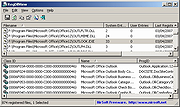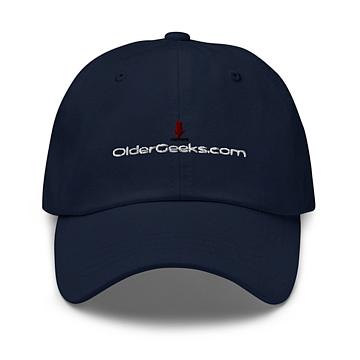 |
RegDllView 32bit v1.60
RegDllView 32bit v1.60
RegDllView is a small utility that displays the list of all registered dll/ocx/exe files (COM registration). For each registered file, you can view the last date/time that it was registered, and the list of all registration entries (CLSID/ProgID).
RegDllView also allows you to unregister dll/ocx files that you don't need on your system anymore. If you have dll/ocx files that don't exist on your system anymore, but their registration entries are still exist in your Registry, you can manually remove these entries by using 'Delete All Entries For Selected Files' option.
Starting from version 1.35, RegDllView also allows you to register dll/ocx files (like regsvr32), simply by dragging one or more files from Explorer folder into the window of RegDllView.
System Requirements
This utility works on any version of Windows - from Windows 98 to Windows 10. There is also a separated download for handling x64 registrations.
Versions History
Version 1.60:
Added 'File Extension' column.
Start Using RegDllView
RegDllView doesn't require any installation process or additional DLLs. Just copy the executable file (RegDllView.exe) to any folder you like, and run it.
The main window of RegDllView has 2 panes:
The upper pane - Displays the list of all registered files.
The lower pane - Displays the list of all COM registration entries of the selected file in the upper pane.
Tips for using RegDllView
If you want to view the files that registered in the last hours/days, simply click the 'Last Registered On' column, and the list will be sorted according to the registration date.
If you want to find obsolete registrations on your system, simply click the 'Missing File' in order to sort the list by 'Missing File' status.
... |
 |
8,861 |
Apr 26, 2019
Nir Sofer  |
 |
RegDllView 64bit v1.60
RegDllView 64bit v1.60
RegDllView is a small utility that displays the list of all registered dll/ocx/exe files (COM registration). For each registered file, you can view the last date/time that it was registered, and the list of all registration entries (CLSID/ProgID).
RegDllView also allows you to unregister dll/ocx files that you don't need on your system anymore. If you have dll/ocx files that don't exist on your system anymore, but their registration entries are still exist in your Registry, you can manually remove these entries by using 'Delete All Entries For Selected Files' option.
Starting from version 1.35, RegDllView also allows you to register dll/ocx files (like regsvr32), simply by dragging one or more files from Explorer folder into the window of RegDllView.
System Requirements
This utility works on any version of Windows - from Windows 98 to Windows 10. There is also a separated download for handling x64 registrations.
Versions History
Version 1.60:
Added 'File Extension' column.
Start Using RegDllView
RegDllView doesn't require any installation process or additional DLLs. Just copy the executable file (RegDllView.exe) to any folder you like, and run it.
The main window of RegDllView has 2 panes:
The upper pane - Displays the list of all registered files.
The lower pane - Displays the list of all COM registration entries of the selected file in the upper pane.
Tips for using RegDllView
If you want to view the files that registered in the last hours/days, simply click the 'Last Registered On' column, and the list will be sorted according to the registration date.
If you want to find obsolete registrations on your system, simply click the 'Missing File' in order to sort the list by 'Missing File' status.
... |
 |
8,949 |
Apr 26, 2019
Nir Sofer  |













